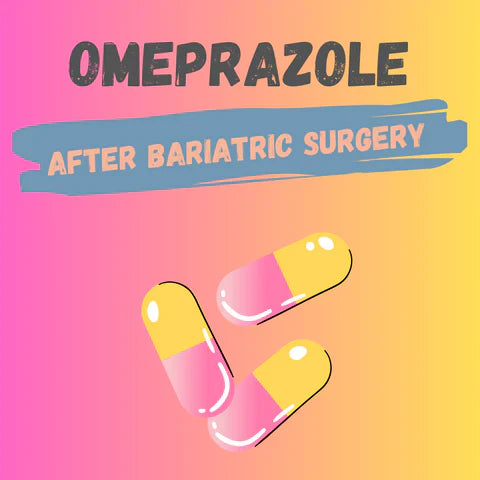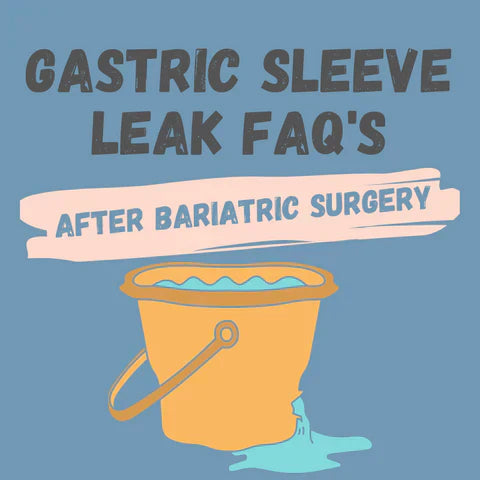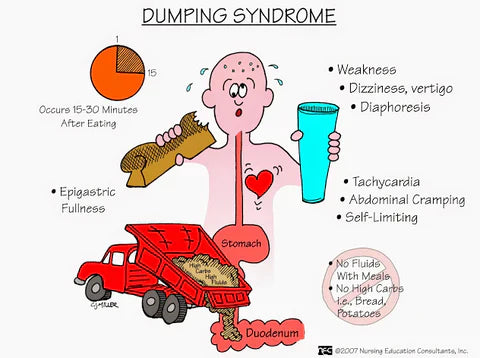Your cart is empty
Complete Gastric Sleeve Diet Guide
Everything you need to know for successful eating before and after gastric sleeve surgery
🧭 Quick Navigation
Understanding the Gastric Sleeve Diet
The gastric sleeve diet is a carefully structured eating plan designed to support patients before and after sleeve gastrectomy surgery. This bariatric surgery reduces your stomach size by approximately 75%, creating a sleeve-shaped pouch that dramatically limits food intake.
💡 Key Success Factors
Following your gastric sleeve diet plan isn't just about weight loss—it's essential for proper healing, preventing complications, and achieving long-term success. The diet progresses through specific phases to gradually reintroduce foods while your stomach heals.
The gastric sleeve diet is not just a temporary eating plan—it's a complete lifestyle transformation. Patients who embrace this new way of eating from day one, rather than viewing it as a restriction, consistently achieve the best long-term outcomes. Success starts with understanding that your relationship with food is permanently changing for the better.
Dr. Kevin Huffman, Bariatric Physician
Pre-Surgery Gastric Sleeve Diet
Your diet before gastric sleeve surgery typically begins 2-4 weeks before your procedure. This pre-operative diet serves crucial purposes:
✅ Pre-Op Goals
- Shrink liver size for safer surgery
- Reduce surgical complications
- Practice portion control
- Begin healthy eating habits
- Lose initial weight
📋 Pre-Op Guidelines
- Calories: 800-1,200 per day
- Carbs: Less than 100g daily
- Protein: 60+ grams daily
- Focus: Lean proteins, vegetables
- Avoid: Refined sugars, fried foods
⚠️ 48-72 Hours Before Surgery
Switch to clear liquids only: water, broth, sugar-free gelatin, and decaffeinated beverages. Stop all food and drink at midnight before surgery day.
I cannot overstate the importance of following the pre-operative diet exactly as prescribed. When patients skip this phase or don't take it seriously, I've seen increased surgical complications, longer procedure times, and more difficult recoveries. The pre-op diet literally shrinks your liver and makes surgery safer. It's not optional—it's a critical part of your surgical success.
Dr. Kevin Huffman, Bariatric Physician
Post-Surgery Diet Phases
Your diet after gastric sleeve surgery follows a structured progression to ensure proper healing and gradual stomach adaptation:
Week 1: Clear Liquid Phase
Duration: First 7 days after surgery
Portion Size: 1-2 ounces every 15 minutes
✅ Allowed Clear Liquids
- Water (primary focus)
- Clear broth (chicken, beef, vegetable)
- Sugar-free gelatin
- Decaffeinated tea
- Sugar-free popsicles
- Crystal Light or similar
❌ Avoid During Phase 1
- Carbonated beverages
- Caffeinated drinks
- Sugary drinks
- Fruit juices
- Alcohol
- Any solid foods
Week 2: Full Liquid Phase
Duration: Days 8-14 after surgery
Portion Size: 2-4 ounces per meal
✅ Full Liquid Options
- Protein shakes (sugar-free)
- Greek yogurt (plain, low-fat)
- Milk (skim or low-fat)
- Smooth soups
- Sugar-free pudding
- Applesauce (unsweetened)
🎯 Phase 2 Goals
- Start protein intake: 40-50g daily
- Maintain hydration: 64+ oz fluids
- Begin vitamin supplements
- Monitor tolerance carefully
Week 3: Pureed Food Phase
Duration: Days 15-21 after surgery
Portion Size: 1/4 cup per meal
✅ Pureed Food Options
- Pureed lean meats
- Mashed eggs
- Pureed fish
- Mashed beans
- Pureed vegetables
- Soft cottage cheese
- More bariatric puree recipes
📝 Pureed Food Rules
- Baby food consistency
- No lumps or chunks
- Chew thoroughly
- Eat very slowly
- Stop when satisfied
Week 4+: Soft Food Phase
Duration: Week 4 onwards
Portion Size: 1/2 to 3/4 cup per meal
✅ Soft Food Options
- Tender chicken or fish
- Scrambled eggs
- Soft cooked vegetables
- Well-cooked pasta
- Soft fruits (bananas)
- Low-fat cheese
❌ Still Avoid
- Tough meats (steak)
- Fibrous vegetables
- Nuts and seeds
- Raw vegetables
- Whole grain breads
- Fried foods
The biggest mistake I see patients make is thinking that once they can eat solid foods, the rules don't matter anymore. How you eat is just as important as what you eat. Patients who master these eating behaviors—small bites, thorough chewing, eating slowly—maintain their weight loss long-term. Those who rush back to old eating habits often struggle with regain.
Dr. Kevin Huffman, Bariatric Physician
Best Gastric Sleeve Foods to Eat
Focus on nutrient-dense, high-protein foods that support healing and weight loss. For convenient options, check out our selection of bariatric-approved weight loss foods designed specifically for post-surgery nutrition needs:
🥩 Lean Proteins
- Skinless chicken breast
- White fish (cod, tilapia)
- Salmon and tuna
- Lean ground turkey
- Eggs and egg whites
- Low-fat cottage cheese
- Greek yogurt
- Tofu and tempeh
🥬 Vegetables
- Spinach and leafy greens
- Carrots (cooked soft)
- Green beans
- Zucchini and squash
- Bell peppers (cooked)
- Tomatoes
- Cauliflower
- Sweet potatoes
🍎 Soft Fruits
- Bananas
- Applesauce (unsweetened)
- Soft melons
- Peeled peaches
- Berries (in moderation)
- Canned fruit (in juice)
🌾 Complex Carbs
- Oatmeal
- Quinoa
- Brown rice (small portions)
- Sweet potatoes
- Whole grain crackers
- Beans and lentils
Gastric Sleeve Foods to Avoid
These gastric sleeve food restrictions help prevent complications and support your weight loss goals:
❌ High-Fat Foods
- Fried foods
- Fatty cuts of meat
- Full-fat dairy products
- Butter and margarine
- Processed cheese
- Cream-based sauces
❌ Sugary Foods & Drinks
- Candy and chocolate
- Cakes and pastries
- Ice cream
- Soda and soft drinks
- Fruit juices
- Sports drinks
❌ Difficult to Digest
- Tough red meat
- Raw vegetables
- Nuts and seeds
- Popcorn
- Fibrous vegetables (celery)
- Dried fruits
❌ Problematic Items
- Carbonated beverages
- Alcohol
- Caffeine (initially)
- White bread and pasta
- Rice (large portions)
- Spicy foods (initially)
⚠️ Why These Restrictions Matter
These foods can cause dumping syndrome, nausea, vomiting, or stomach irritation. They also provide empty calories that work against your weight loss goals and may stretch your new stomach pouch.
Protein Requirements After Gastric Sleeve
Protein is crucial for healing, muscle preservation, and feeling satisfied. Aim for 60-80 grams daily:
🥩 High-Protein Food Comparison (per 3 oz serving)
💡 Protein Tips for Success
- Eat protein first at every meal
- Consider bariatric protein shakes if struggling to meet goals
- Choose complete proteins (contain all essential amino acids)
- Spread protein intake throughout the day
- Track your intake with a food diary app
Protein deficiency is one of the most common nutritional complications I see after gastric sleeve surgery. Your body is in healing mode and rapidly losing weight—without adequate protein, you'll lose muscle mass instead of fat. I tell my patients: if you only focus on one nutritional goal, make it protein. Everything else can be adjusted, but protein is non-negotiable.
Dr. Kevin Huffman, Bariatric Physician
Essential Eating Rules After Surgery
How you eat is just as important as what you eat:
⏰ Timing Rules
- Small, frequent meals: 4-6 times daily
- No drinking with meals: Wait 30 minutes after eating
- Slow eating: 20-30 minutes per meal
- Stop when satisfied: Not full
🍽️ Portion Guidelines
- Protein: Palm-sized portion
- Vegetables: 1/2 cup cooked
- Carbs: 1/4 cup maximum
- Total meal: 1/2 to 3/4 cup
😋 Eating Technique
- Chew thoroughly: 20-25 times
- Take small bites: Teaspoon-sized
- Put utensils down: Between bites
- Mindful eating: No distractions
💊 Supplements Needed
- Bariatric multivitamins: Daily
- Calcium + Vitamin D: 1200-1500mg
- B12: 500mcg daily
- Iron: As recommended
Long-term Success with Your Sleeve Diet
Your bariatric sleeve diet is a lifelong commitment. Here's how to maintain success:
🎯 Monthly Goals
- Track weight loss progress
- Monitor vitamin levels
- Assess food tolerances
- Adjust portion sizes
- Stay hydrated consistently
🏃 Lifestyle Integration
- Regular exercise routine
- Support group participation
- Meal planning and prep
- Stress management
- Regular medical follow-ups
🏆 Signs of Success
You're on track when you can eat small portions comfortably, feel satisfied (not stuffed), maintain steady weight loss, have good energy levels, and can tolerate a variety of healthy foods without discomfort.
Five years post-surgery, the patients who maintain their weight loss share one common trait: they never stopped following their dietary guidelines. They've made peace with smaller portions and understand that their sleeve is a tool, not a magic solution. The most successful patients view their new eating pattern as freedom from food obsession, not as deprivation.
Dr. Kevin Huffman, Bariatric Physician
Frequently Asked Questions
Can I ever eat normal foods again?
Yes! By 8-12 weeks post-surgery, most patients can eat almost any texture of food, provided they follow portion control and chew thoroughly. However, some foods may always be difficult to tolerate.
Will I need to count calories forever?
Initially, yes. Tracking helps ensure you meet protein goals and stay within calorie limits. Over time, many patients develop intuitive eating skills, but periodic tracking helps maintain long-term success.
What if I can't tolerate certain foods?
Food intolerances are common and can change over time. Work with your dietitian to find alternatives and try reintroducing foods periodically as your stomach heals.
How much weight can I expect to lose?
Most patients lose 60-70% of excess weight within 12-18 months when following their diet plan consistently and incorporating regular exercise.
Ready to Start Your Journey?
Remember: Your gastric sleeve diet success depends on consistency, patience, and following medical guidance. Work closely with your healthcare team, stay committed to the process, and celebrate small victories along the way.
Disclaimer: This guide is for educational purposes only. Always follow your surgeon's and dietitian's specific instructions, as individual needs may vary.

Author: Carrie H. Carrie is a passionate health and nutrition writer who transforms complex medical research into accessible, evidence-based content to empower readers to make informed choices about their wellbeing. With a background in science and a dedication to helping others live healthier lives, she provides thoughtful analysis of the latest studies and practical, actionable advice readers can apply to their own lives. |
Reviewed By: Dr. Kevin Huffman Dr. Huffman is an accomplished board-certified bariatric physician with extensive clinical experience and expertise in treating obesity. He has trained countless healthcare providers and founded American Bariatric Consultants to develop highly sought-after protocols, training materials and continuing education used widely by medical societies, hospitals and physicians. Dr. Huffman's impact reaches far beyond direct patient care, as he actively prepares the next generation of physicians to achieve board certification in bariatrics, thereby exponentially expanding access to this vital medical treatment. |
- Choosing a selection results in a full page refresh.











